Gout
- Gout is usually characterized by a sudden onset of severe pain, redness and swelling of a joint.
- The joint affected is usually the great toe joint, but subsequent attacks can occur anywhere. The attack usually occurs at night or is first noticed when you wake up in the morning. The pain is so intense that the sheet touching the joint is excruciating.
- There is usually no history of trauma to the area.
- Gout can affect anyone but it is more common in men than women. The incidence of Gout in women does increase after menopause.
- The acute pain associated with Gout is usually self-limiting but residual sub-acute pain in the joint can last for days to weeks.
- Gout is caused when urate crystals accumulate in the joint.
- Urate crystals form when there are high levels of uric acid in your blood.
- Our bodies produce uric acid normally when it breaks down purines. Purines are present normally in our body but it is also present in certain foods.
- Uric acid is normally processed by our kidneys and excreted in our urine. Certain conditions can occur in which we either make too much uric acid or cannot get rid of it fast enough. When this condition occurs Urate crystals are deposited in and around the joint. The crystals act as an irritant and cause an inflammatory reaction resulting in pain, swelling, and redness. Repeated attacks can lead to joint destruction.
- The good news is that there are life style changes that may reduce the risk of an attack. There are also medications available to an acute attack and prevent subsequent attacks.
- So if you wake up and have a red, hot, swollen big toe joint call your doctor. If you have a fever associated with a hot swollen joint seek medical attention immediately whereas you may have an infection.
Prevention
A gout attack occurs when excessive levels of uric acid in the blood are converted to urate crystals which deposit in our joints. The goal of prevention should focus on decreasing the levels of uric acid in your body.
- Medical conditions associated with Gout. If you have HTN, DM or high cholesterol make sure you have it under control. Increase incidence of gout in these cases. Unfortunately some medications in the treatment of these diseases can actually cause a gout attack.
- Maintain healthy body weight. Increased risk of gout attack with obesity. Don’t take it all off at once – fasting can cause a gout attack.
- Limit Alcohol quantity especially beer.
- Stay hydrated but limit sugary drinks. Decaf or regular coffee has been shown to decrease uric acid levels.
- Limit certain foods that contain a lot of purines such as organ meats, red meats, turkey, oilyfishes like anchovies, cod, and herring, scallops and certain vegetables like asparagus and mushrooms.
- Try low purine diet like low fat dairy, egg whites, whole grains, vegetables and citrus fruits. Vitamin C has been show to decrease uric acid levels. Cherries and dark berries has also been shown to decrease uric acid level in the blood.
Acute Treatment
So you changed your diet and you still got an acute gout attack what to do:
Call your doctor immediately! There are many effective medications to treat an acute gout attack.
- NSAIDs – ibuprofen, naproxen, indomethacine
- Colchicine
- Corticosteroids like prednisone.
- Hydrate but no alcohol.
- Limit intake of meat, poultry and fish.
Long Term Treatment
Your primary care physician has multiple options to help prevent future attacks.
- Drugs to block uric acid production: like zyloprim or uloric
- Drugs to improve uric acid excretion: probenecid
Long Term Effects of Gout
Repeated gout attacks can lead to damage and deformity of the joint, as well as, the development of topheaous deposits around the joint. In some cases you may develop kidney stones.
*If you are having an Acute Gout attack or are suffering from a damaged joint due to repeated gout attacks call our office (numbers below) or fill out the contact form and we will contact you.











 114 West Mount Pleasant Ave
114 West Mount Pleasant Ave